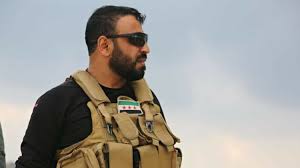Mohammed al-Jassim, better known as Abu Amsha, is one of the most controversial figures to emerge from the Syrian conflict. A self-styled leader and the head of the Turkish-backed Sultan Suleiman Shah Division, his journey from an uneducated agricultural worker to a warlord wielding significant power exemplifies the chaotic transformation of Syria’s revolution into a fractured landscape of opportunistic factions. Abu Amsha’s influence spans military operations, human rights abuses, financial exploitation, and even international outreach, with allegations of corruption, sexual violence, and systematic extortion trailing his rise to prominence. Despite widespread accusations of war crimes and exploitation in Afrin, where his faction operates under Turkish patronage, he has leveraged his position to build a multi-million-dollar empire with investments stretching as far as Africa. A polarizing and caricature-like figure, Abu Amsha represents both the grim realities of the Syrian war and the perils of unchecked power.
Early Life and Background
Born in 1987 in the village of Jusa, near the town of al-Saqilbiyah in the northern countryside of Hama, Mohammed al-Jassim, widely known as Abu Amsha, claims Turkmen descent and holds Turkish citizenship. Before the outbreak of the Syrian revolution in 2011, he worked as a driver of agricultural equipment and lacked formal education. Despite his humble beginnings, Abu Amsha would go on to become one of the most controversial and prominent warlords in Turkish-controlled northern Syria.
Rise Through the Ranks
In the early days of the Syrian crisis, Abu Amsha formed a militia called the “Line of Fire” brigade, primarily composed of members of his Bani Jamil clan. Initially aligned with the Free Syrian Army (FSA), the group gained financial backing from Gulf-based donors. Over time, it became affiliated with the Syria Revolutionaries Front and later the Levantine Front after disputes with Jabhat al-Nusra (now Hay’at Tahrir al-Sham). Forced to flee from Idlib after clashes with extremist factions, Abu Amsha rebranded his militia as the “Sultan Suleiman Shah Division” in 2016, in a move that solidified Turkish support.
Military Operations and Turkish Allegiance
The Sultan Suleiman Shah Division, part of the Turkish-backed Syrian National Army, participated in multiple Turkish-led military operations, including:
– Operation Euphrates Shield (2016): Targeting ISIS and Kurdish forces in northern Aleppo.
– Operation Olive Branch (2018): Resulting in the occupation of Afrin, a Kurdish-majority area.
– Operation Peace Spring (2019): Capturing Tal Abyad and Ras al-Ayn in northern Syria.
Under his leadership, the division became notorious for human rights violations, including looting, kidnappings, and arbitrary arrests. Abu Amsha also sent mercenaries to Libya and Azerbaijan on Turkish orders, reportedly earning significant sums through the deployment of these fighters.
Human Rights Violations and Financial Exploitation
Abu Amsha’s rule in Afrin has been marred by accusations of war crimes and rampant corruption. His faction stands accused of extorting Kurdish residents, confiscating property, and imposing tributes on agricultural production, particularly olives. Witnesses and local reports indicate that his militia demanded up to 30% of harvest yields as “taxes.” Additionally, water resources in Afrin were privatized under his watch, forcing farmers to pay exorbitant fees for irrigation.
The leader himself is alleged to have amassed significant wealth, with investments in Syria, Turkey, and Africa, including properties in Cameroon and Mozambique. His faction’s estimated annual income exceeds $30 million, derived from extortion, smuggling, and misappropriation of humanitarian aid.
Personal and Sexual Misconduct Allegations
In addition to financial and military abuses, Abu Amsha has faced serious allegations of sexual violence. In 2019, a woman named Israa publicly accused him of repeated rape, claiming she was coerced under threat to her family. Despite initial promises of protection from judicial authorities, Israa disappeared under suspicious circumstances, fueling speculation of Abu Amsha’s involvement.
International Reach and Humanitarian Facade
Dubbed the “Intercontinental Man,” Abu Amsha extended his influence beyond Syria by sending humanitarian aid to African countries like Cameroon and Mozambique, in coordination with Turkish agencies. Critics, however, view these acts as cynical attempts to bolster his image while Syrians under his control suffer extreme poverty.
A Polarizing Figure
Abu Amsha is seen by supporters as a loyal ally of Turkey, regularly praising President Recep Tayyip Erdogan and displaying the Turkish flag alongside his faction’s insignia. However, he is widely ridiculed for his ostentatious displays of wealth, including luxury vehicles and lavish public appearances. These displays, coupled with his social media antics, have made him a caricature of leadership in the eyes of many Syrians.
Current Status and Legacy
As of now, Abu Amsha continues to operate under the protection of Turkish authorities, maintaining his grip on Afrin and expanding his influence in Africa. His controversial methods of governance, military operations, and financial exploits have cemented his reputation as a symbol of the Syrian conflict’s descent into warlordism.
Abu Amsha’s story encapsulates the transformation of the Syrian revolution from a quest for freedom to a fragmented conflict dominated by opportunists, leaving behind a legacy of exploitation and disillusionment.
Takeaway
Mohammed al-Jassim, or Abu Amsha, stands as a stark embodiment of the warlordism that has marred the Syrian conflict, overshadowing the revolution’s original aspirations for freedom, justice, and dignity. His rise from a modest background to a figure wielding military, political, and financial influence is marked by allegations of corruption, exploitation, and human rights violations. Shielded by Turkish patronage, he has transformed his militia into a vehicle for personal enrichment and regional expansion, leaving a trail of suffering among those under his control. Abu Amsha’s story is not only a cautionary tale of the consequences of external interference and fractured opposition but also a reminder of the profound human cost of unchecked ambition in a war-torn nation.


